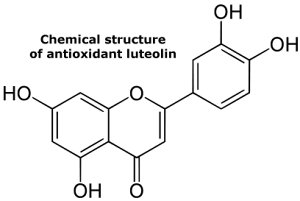 A flavonoid compound found in fruit and vegetables, luteolin, was recently hailed as an anticancer supernutrient by the tabloid media. Aside from the fact that over-dosing on antioxidants could be detrimental to one’s front-line immune response to pathogens, the research was purely laboratory based and said nothing about whether or not luteolin might actually prevent bowel cancer. The compound has the chemical name 2-(3,4-dihydroxyphenyl)- 5,7-dihydroxy-4-chromenone and in the laboratory shows activity as an inhibitor of phosphodiesterase enzymes as well as blocking interleukin 6.
A flavonoid compound found in fruit and vegetables, luteolin, was recently hailed as an anticancer supernutrient by the tabloid media. Aside from the fact that over-dosing on antioxidants could be detrimental to one’s front-line immune response to pathogens, the research was purely laboratory based and said nothing about whether or not luteolin might actually prevent bowel cancer. The compound has the chemical name 2-(3,4-dihydroxyphenyl)- 5,7-dihydroxy-4-chromenone and in the laboratory shows activity as an inhibitor of phosphodiesterase enzymes as well as blocking interleukin 6.
NHS Choices, as ever, dissects the study, saying that the research may have homed in on the specific signalling pathway through which luteolin can kill bowel cancer cells in the laboratory. The study did not investigate whether upping one’s intake of luteolin-rich foods would have any effect on bowel cancer risk.
The lab study is an essential first step to understanding whether luteolin or more likely a chemical cousin might eventually be developed as an anticancer drug, although this is preliminary, fundamental molecular biology not clinical testing and animal studies for initial testing of such a compound are still a long way off. A drug might never emerge from this research.
Luteolin is found in celery, green pepper, thyme, dandelion, perilla, chamomile tea, carrots, olive oil, peppermint, rosemary, navel oranges, and oregano, fruit rinds, woody barks, clover blossom and ragweed pollen. It has also been isolated from Salvia tomentosa.
NHS Choices emphasises that, “It is important to remember that this study used pure luteolin, and not dietary sources of the compound. The effect of dietary luteolin on cancer is not clear from this research.” Of course, one has to presume that eating a diverse mixture of fresh fruit and vegetables as part of a well-balanced diet (whatever that means) is to be encouraged nevertheless.